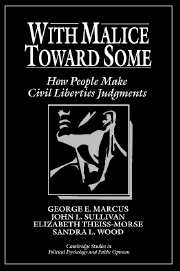Book contents
- Frontmatter
- Contents
- List of Figures and Tables
- Preface: Political Tolerance and Democratic Life
- PART I Theoretical Background and Overview
- PART II Contemporary Information and Political Tolerance Judgments
- PART III Refining the Model – The Role of Antecedent Considerations as Individual Differences
- 5 Threat and Political Tolerance
- 6 Democratic Values as Standing Decisions and Contemporary Information
- 7 Source Credibility, Political Knowledge, and Malice in Making Tolerance Judgments – The Texas Experiment
- 8 Individual Differences: The Influence of Personality
- PART IV Implications and Conclusions
- Appendix A: Hypothetical Group Scenarios and Manipulations
- Appendix B: Methodological Approaches and Scales
- Notes
- References
- Index
7 - Source Credibility, Political Knowledge, and Malice in Making Tolerance Judgments – The Texas Experiment
Published online by Cambridge University Press: 05 August 2012
- Frontmatter
- Contents
- List of Figures and Tables
- Preface: Political Tolerance and Democratic Life
- PART I Theoretical Background and Overview
- PART II Contemporary Information and Political Tolerance Judgments
- PART III Refining the Model – The Role of Antecedent Considerations as Individual Differences
- 5 Threat and Political Tolerance
- 6 Democratic Values as Standing Decisions and Contemporary Information
- 7 Source Credibility, Political Knowledge, and Malice in Making Tolerance Judgments – The Texas Experiment
- 8 Individual Differences: The Influence of Personality
- PART IV Implications and Conclusions
- Appendix A: Hypothetical Group Scenarios and Manipulations
- Appendix B: Methodological Approaches and Scales
- Notes
- References
- Index
Summary
Since we conducted our original experiment in 1989, a number of events have occurred to alter the political environment related to the study of political tolerance. The Los Angeles riots following the Rodney King verdict, the murder of doctors by prolife advocates, and the rise and fall of David Duke provide prominent examples of dramatic events involving political tolerance issues that have occurred since our initial experiments. Highly visible and salient incidents can activate citizens' attitude structures – stimulating cogitation and arousing emotional reactions – that under more mundane circumstance would remain dormant. These sensational events raised the salience of political, social, and racial tolerance issues. It is therefore vital to establish that the subsequent change in political context did not alter in fundamental ways the processes by which citizens arrive at their tolerance judgments. In short, a substantial replication of our basic findings from the late 1980s and early 1990s would provide greater confidence that our results are not entirely time bound, but can be generally applied to the process of making political tolerance judgments.
In addition to attempting to verify the basic findings obtained in the studies described in Chapters 4 and 6, the research described in this chapter was designed to test a more completely specified model of political tolerance judgments. This research incorporated an examination of the role of source credibility and political expertise.
- Type
- Chapter
- Information
- With Malice toward SomeHow People Make Civil Liberties Judgments, pp. 133 - 159Publisher: Cambridge University PressPrint publication year: 1995



